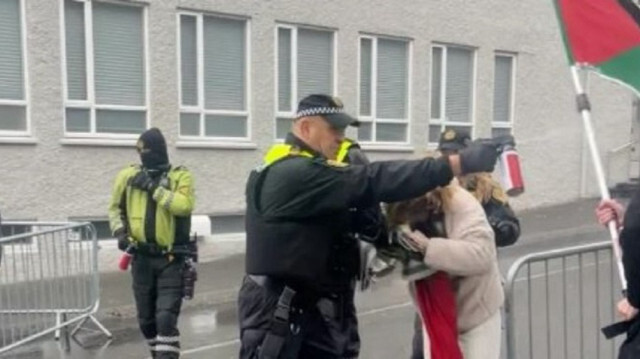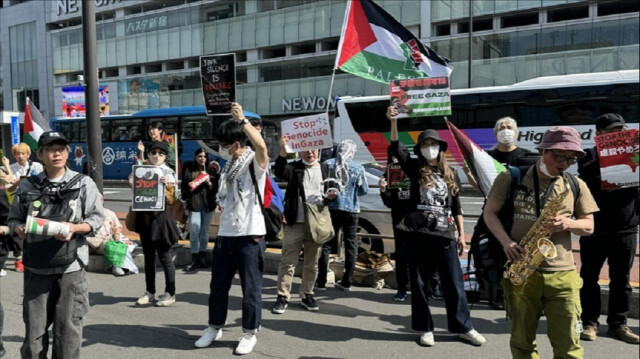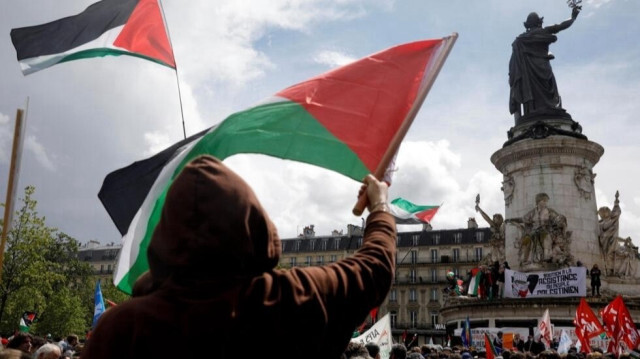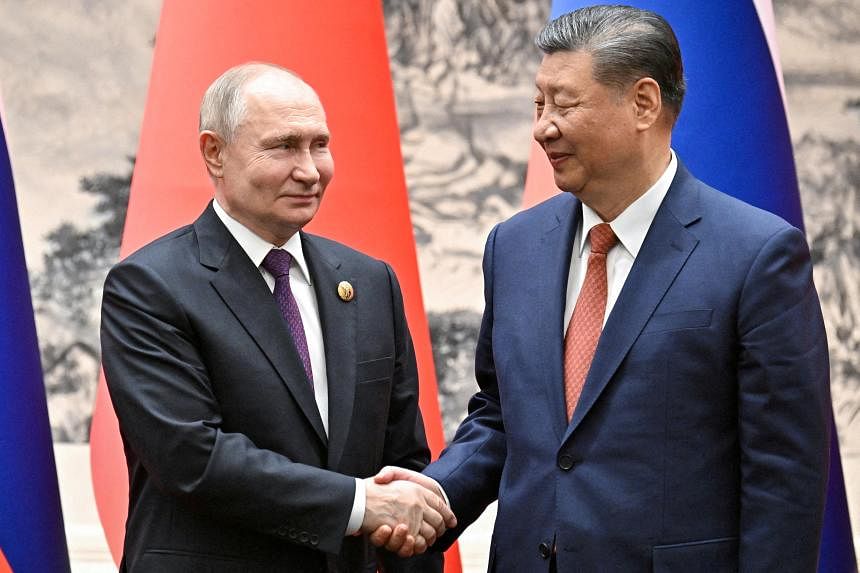GAZA SOLIDARITY
Police use pepper spray on pro-Palestinian protesters in Iceland

Icelandic police used pepper spray on pro-Palestinian protesters who took to the streets of the capital Reykjavik against the government's inaction against Israeli brutal assault on Gaza, local media reported on Friday.
The group behind the protest, called the Iceland-Palestine Association, attempted to block traffic this morning demanding that the Icelandic state impose trade restrictions on Israel and end political relations with the country, according to public broadcaster RUV.
This is the second protest to take place this week, after a group of pro-Palestinian demonstrators staged a sit-in protest in the lobby of the Foreign Ministry Thursday.
The group established itself in the lobby of the ministry, with their stated goal to disrupt the normal functioning of authorities until they act, said RUV.
The protest is not led by a specific organization, but rather a group of local residents who oppose the government's inaction on Palestine, Salvor Gullbra Thorarinsdottir, one of the protesters, told the broadcaster.
"Now 234 days have passed since the escalating genocide of the Palestinian people and the Icelandic authorities have done nothing to prevent it," Thorarinsdottir added.
She pointed out that the government has talked about wanting a cease-fire in Gaza "or insisting that they aim for peace and a two-state solution, but these are all empty words and no actions follow."
Thorarinsdottir referred to the Israeli army's recent attack on Rafah as "a horrible attack where people were burned alive." For her and others taking part in the protest, this marked a tipping point.
Israel continues bombarding southern Gaza's city of Rafah, which shelters hundreds of thousands of civilians, despite international condemnation.
RUV reported that the protesters have several demands.
They want Iceland to impose trade sanctions on Israel and sever political ties.
Furthermore, the Iceland-Palestine Association demands that the government support South Africa's genocide case against Israel at the International Court of Justice (ICJ) and that Foreign Minister Gylfadottir initiates dialogue with other Nordic nations, as well as Ireland and Spain, to coordinate actions.
Norway, Spain, and Ireland have formally recognized Palestine as a state on Tuesday in what Spanish Prime Minister Pedro Sanchez called a "historic decision."
It is therefore Iceland's duty to coordinate actions with these countries, given that it also recognized Palestine in 2011, the protesters demanded.
Since Israel started its brutal offensive on Gaza more than 36,200 Palestinians, mostly women and children, have been killed and over 81,700 injured amid mass destruction and shortages of necessities.
The Israeli war has pushed 85% of Gaza's population into internal displacement amid acute shortages of food, clean water, and medicine, while 60% of the enclave's infrastructure has been damaged or destroyed, according to the UN.
Israel is accused of genocide at the International Court of Justice. An interim ruling ordered Tel Aviv to stop genocidal acts and take measures to guarantee that humanitarian assistance is provided to civilians in Gaza.
Pro-Palestine protests in Japan demand divestment from Israel
Demonstrators gather outside Ministry of Defense, demanding end to import of attack drones from Israeli 'death merchants'
07:14 - 31/05/2024 Friday
AA

Protesters in Tokyo gathered outside Japan's Ministry of Defense on Friday, demanding an end to the import of Israeli-made attack drones.
The demonstration, organized by the Network Against the Arms Trade (NAJAT), called on the ministry to stop purchasing drones from Israeli companies, labeled as "death merchants" by the activists.
In a post on X, a NAJAT representative urged the ministry to heed the public's call and said: “Ministry of Defense should be ashamed.”
Separately, an online petition organized by a group called Citizens Unity With Palestine called on Kawasaki Heavy Industries to immediately cancel its contract with Israel Aerospace Industries and stop importing and selling attack drones. The petition has already gained 21,000 signatures.
Previously, similar divestment protests took place in several countries, including Australia, the UK and the US, with some of them proving successful such as Australia's Melbourne University's decision about full disclosure of all weapons manufacturers amid calls for divestment from Israel.
'France, which is complicit in genocide, is not our France,' says Sebastien Delogu
22:46 - 30/05/2024 Thursday
AA

French opposition lawmaker Sebastien Delogu, who was suspended for 15 days from his duties in the French National Assembly for displaying the Palestinian flag, appealed to the European Court of Human Rights (ECHR) on Thursday over the move.
Delogu, a member of parliament from the leftist La France Insoumise (France Unbowed, LFI) party representing Bouches-du-Rhone's 7th constituency, said on X that being sanctioned for displaying the flag of a "colonized and slaughtered people" is "befitting an authoritarian regime."
Pointing to French President Emmanuel Macron's administration, Delogu said that "voices of peace are being subjected to the bans, calls and violence of a dying power."
He announced that he has appealed to the ECHR regarding his 15-day suspension from the National Assembly for displaying the Palestinian flag.
"France, which is complicit in genocide, is not our France," Delogu said.
The session of the French National Assembly on May 28 was adjourned after Delogu displayed the Palestinian flag.
Police arrest 'many' at Israel-Hamas war protest at UC Santa Cruz, school says
Police in riot gear surrounded arm-in-arm protesters Friday at the University of California, Santa Cruz, to remove an encampment and barricades where pro-Palestinian demonstrations have blocked the main entrance to the campus this week. Many people were arrested, the university said.
Campus, local and state police swarmed the protesters, and video from local news stations showed officers telling people to leave, then taking away signs and part of a barricade. There appeared to be some pushing and shoving between police and protesters. Officers carried zip ties and appeared to detain a few people.
“For weeks, encampment participants were given repeated, clear direction to remove the encampment and cease blocking access to numerous campus resources and to the campus itself,” Scott Hernandez-Jason, a spokesperson for the university, said in a statement Friday.
“They were notified that their actions were unlawful and unsafe. And this morning they were also given multiple warnings by law enforcement to leave the area and disperse to avoid arrest. Unfortunately, many refused to follow this directive and many individuals are being arrested,” Hernandez-Jason said.
It wasn’t known if anyone was injured. The university was holding classes remotely Friday.
Graduate student workers at UC Santa Cruz continued a strike that began last week over the university system’s treatment of pro-Palestinian protesters.
Protest camps sprang up across the U.S. and in Europe this spring as students demanded their universities stop doing business with Israel or companies that they say support its war in Gaza. Organizers seek to amplify calls to end Israel’s war with Hamas, which they describe as a genocide against the Palestinians.
The Associated Press has recorded at least 83 incidents since April 18 in which arrests were made at campus protests across the U.S. More than 3,025 people have been arrested at 62 colleges and universities. The figures are based on AP reporting and statements from universities and law enforcement agencies.
The confrontation in California came a day after arrests at a pro-Palestinian encampment at a Detroit campus and a student walkout during commencement at the Massachusetts Institute of Technology.
On Thursday, police in riot gear removed fencing and broke down tents erected last week on green space near the undergraduate library at Wayne State University in Detroit. At least 12 people were arrested.
President Kimberly Andrews Espy cited health and safety concerns and disruptions to campus operations. Staff were encouraged to work remotely this week, and in-person summer classes were suspended.
The camp, she said, “created an environment of exclusion — one in which some members of our campus community felt unwelcome and unable to fully participate in campus life.”
Another outdoor commencement ceremony was scheduled Friday at MIT in Cambridge, near Boston, a day after some graduates walked out of one, disrupting it for 10 to 15 minutes. They wore keffiyehs, the checkered scarves that represent Palestinian solidarity, over their caps and gowns, chanted “free, free Palestine,” and held signs that said, "All eyes on Rafah.”
“There is going to be no business as usual as long as MIT holds research projects with the Israeli Ministry of Defense,” said David Berkinsky, 27, who earned a doctorate degree in chemistry and walked out. “There are no graduates in Gaza. There are no universities left in Gaza left because Israeli has bombed every single one.”
Some people at the event swore at the protesters and yelled, “Good riddance to Hamas terror fans.” A pro-Palestinian encampment at MIT was cleared in early May.
___
Associated Press journalists Christopher L. Keller, Ed White, Michael Casey and Steve LeBlanc contributed to this report.
Kathy Mccormack, The Associated Press
Artists in Baltimore make kites in honour of Gaza
Kites hold special significance for Gaza, as it set the world record in 2011 for most flown kites simultaneously, when 12,000 children flew kites on the beach.
Brooke Anderson
Washington, DC
31 May, 2024

The event, Kites for Palestine, held at a gallery in the city's cultural district on Thursday evening, drew around two dozen artists from different disciplines. [Brooke Anderson/TNA]
Artists in Baltimore gathered this week to make kites in recognition of Palestinians in war-torn and besieged Gaza.
The event, Kites for Palestine, held at a gallery in the city's cultural district on Thursday evening, drew around two dozen artists from different disciplines.
Using the Palestinian flag colours of green, white, red and black tissue paper with wooden sticks to hold them together, the artists, many of whom had not previously made kites, got to work making different variations in honour of Palestinians in Gaza.
US city passes boycott resolution supporting Palestinian rights
Though most of the kites were based on the Palestinian flag, some were designed in the pattern of the keffiyeh and others were left white with words or drawings on them.
Tirzah Sheppard, a local poet, decided to design a kite to honour Palestinians using the words of the late Palestinian poet Refaat Alareer, who was killed by an Israeli airstrike in December.
"I think it's important for artists to not only reflect the times in their personal lives, but also to reflect the times in the political space, "Sheppard told The New Arab. "Artists are meant to push boundaries and talk about things we don't talk about through artwork. I'm happy to come to an event where I'm able to combine those aspects. I'd love to hear more from artists during this time."
Expressing a similar sentiment on the role of artists, Nik Koskai, a visual artist and an organiser of the event, told TNA, "Artists have a very important role to play in not only speaking about what's happening in Palestine about the genocide, about apartheid, but also to use art that captures that in a way that evokes feeling in people and brings people out onto the streets, and art that supports those struggles."
US, UK firms targeted in Baghdad over Israel's Gaza war
Thursday's event was one of several that have been held by artists in Baltimore in support of Palestinians since Israel's war on Gaza began in October, which has killed more than 36,000 Palestinians in Gaza, mainly women and children. Other "art build" events have had artists create different works, though kites hold special significance for Gaza, as it holds the world record, set in 2011, for the most kites flown simultaneously, when 12,000 children flew kites on the beach.
Artists Against Apartheid, which was born out of the global South African anti-apartheid movement, has been growing in numbers with a commitment to using their platforms to raise awareness of the situation in Palestine.
A passage from a leaflet distributed at the event describing their position and urging other artists to sign reads, "As artists we have a unique responsibility to use out voice and artistic practices to protest apartheid and amplify the just cause of the Palestinian people against occupation and oppression."
May 31, 2024

Pro-Palestinian demonstrators gather to hold the ‘Intifada March’ to protest Israeli attacks on Gaza in Tokyo, Japan on May 11, 2024.

Protesters in Tokyo gathered outside Japan’s Ministry of Defence on Friday, demanding an end to the import of Israeli-made attack drones, Anadolu Agency reports.
The demonstration, organised by the “Network Against the Arms Trade (NAJAT)”, called on the Ministry to stop purchasing drones from Israeli companies, labelled as “death merchants” by the actions.
In a post on X, a NAJAT representative urged the Ministry to heed the public’s call and said: “Ministry of Defence should be ashamed.”
Separately, an online petition organised by a group called “Citizens Unity With Palestine” called on Kawasaki Heavy Industries to immediately cancel its contract with Israel Aerospace Industries and stop importing and selling attack drones. The petition has already gained 21,000 signatures.
Previously, similar divestment protests took place in several countries, including Australia, the UK and the US, with some of them proving successful such as Australia’s Melbourne University’s decision about full disclosure of all weapons manufacturers amid calls for divestment from Israel.
May 31, 2024

Moroccans demonstrate on November 26, 2023 in Casablanca, calling for a permanent ceasefire in the Palestinian Gaza Strip and the suspension of diplomatic ties with Israel. [AFP via Getty Images]
Six hundred Moroccan professors and administrative staff at Abdelmalek Essaadi University in the northern city of Tetouan, have demanded their university cancel a partnership agreement with the Israeli University of Haifa.
In a petition addressed to the university president, the signatories also demanded “the cessation of all forms of normalisation with the [Israeli] occupation entity and all university institutions affiliated with it.”
“Our initiative comes as a step of solidarity with the Palestinian people against the crimes of genocide and crimes against humanity that they have been subjected to for more than eight months,” the petition read, adding that the Israeli occupation forces’ crimes have “deliberately and systematically targeted all higher education institutions” in the besieged Gaza Strip and killed Palestinian university presidents, deans, professors and students.
The partnership deal was signed in September 2022.
University administration decides to halt all ongoing academic cooperation with Israeli universities and research institutions citing human rights violations
Melike Pala |31.05.2024 -

ANKARA
Ghent University in Belgium announced Friday the suspension of all academic cooperation agreements with Israel, citing serious human rights violations by the Israeli government.
In a statement, Ghent University's Rector Rik Van de Walle said the decision was prompted by "the extent, duration, and nature of the human rights violations carried out by the Israeli government."
The statement emphasized that the university administration has decided to halt all ongoing academic cooperation with Israeli universities and research institutions.
While legally unable to terminate existing agreements, the university plans to unilaterally withdraw from relevant projects.
"Ghent University does not want to be involved in very serious human rights and international law violations occurring in Gaza," Van de Walle told Belgium's official news agency Belga.
This move by Ghent University follows similar actions by Brussels Free University and the University of Antwerp, which announced the suspension of their relations with Israel on May 28 and May 30, respectively.
The decision comes amid ongoing student protests, which began in early May, at universities across Belgium, including those in Brussels, Ghent, Antwerp, Leuven and Liege.
France municipalities turn off lights to honour Gaza victims
May 30, 2024

People gather to stage demonstration to show solidarity with Palestinians at Republic Square in Paris, France on May 28, 2024. [Luc Auffret – Anadolu Agency]
Several municipalities in France have turned off the lights at their city hall buildings on Wednesday night to honour civilians Israel killed in the Gaza Strip, Anadolu Agency reports.
Marseille Mayor, Benoit Payan, launched the campaign in response to recent Israeli attacks on the city of Rafah in the southern Gaza Strip.
“The horror of the murderous strikes on Rafah revolts us and touches us to the very depths of our humanity,” Payan said on X, announcing the symbolic gesture to commemorate the victims and urging other municipalities to join.
The mayors of Nantes, Lyon and Bordeaux also participated in the initiative, turning off the lights at their respective city halls to mourn those killed in Gaza by Israeli attacks, according to local media.
Israel has killed more than 36,200 Palestinians, mostly women and children, and injured over 81,700, according to local health authorities.
The Israeli war has pushed 85 per cent of Gaza’s population into internal displacement amid acute shortages of food, clean water and medicine, while 60 per cent of the enclave’s infrastructure has been damaged or destroyed, according to the UN.
Israel stands accused of genocide at the International Court of Justice (ICJ) which, in January, issued an interim ruling that ordered it to stop genocidal acts and take measures to guarantee that humanitarian assistance is provided to civilians in Gaza.






